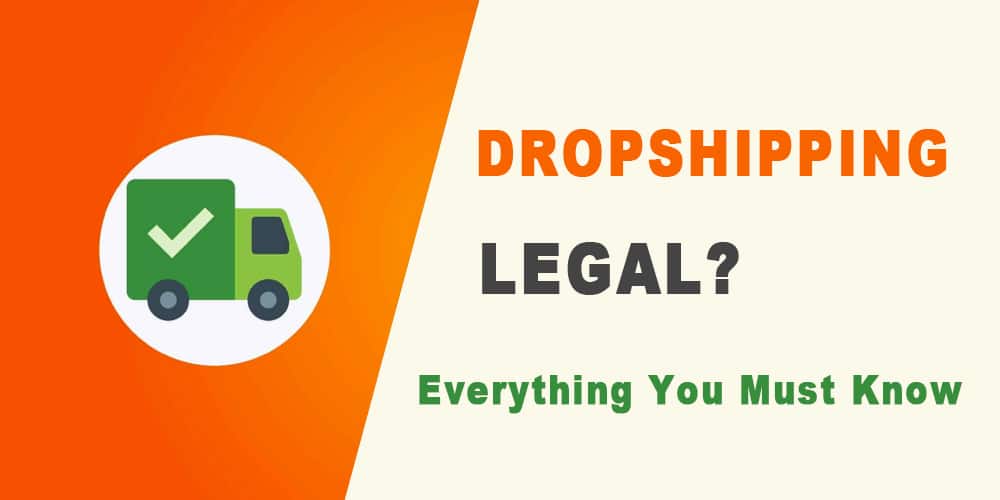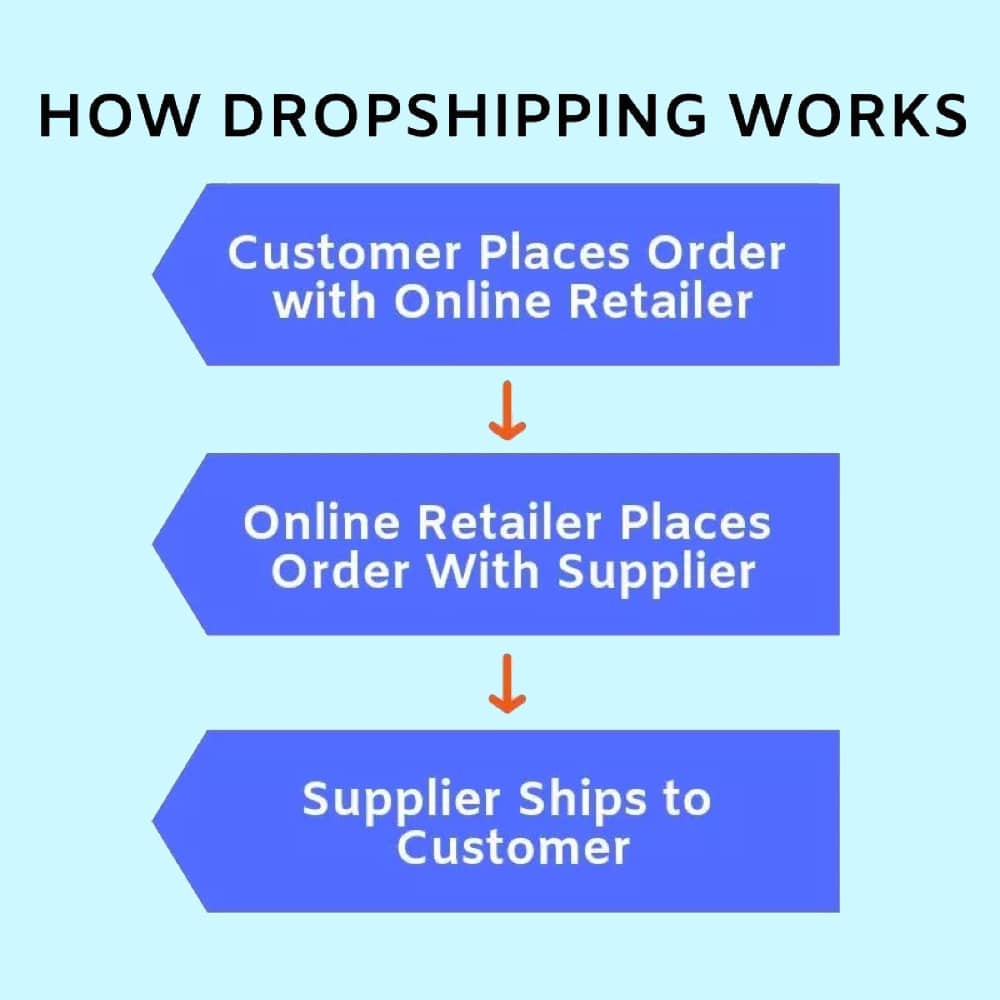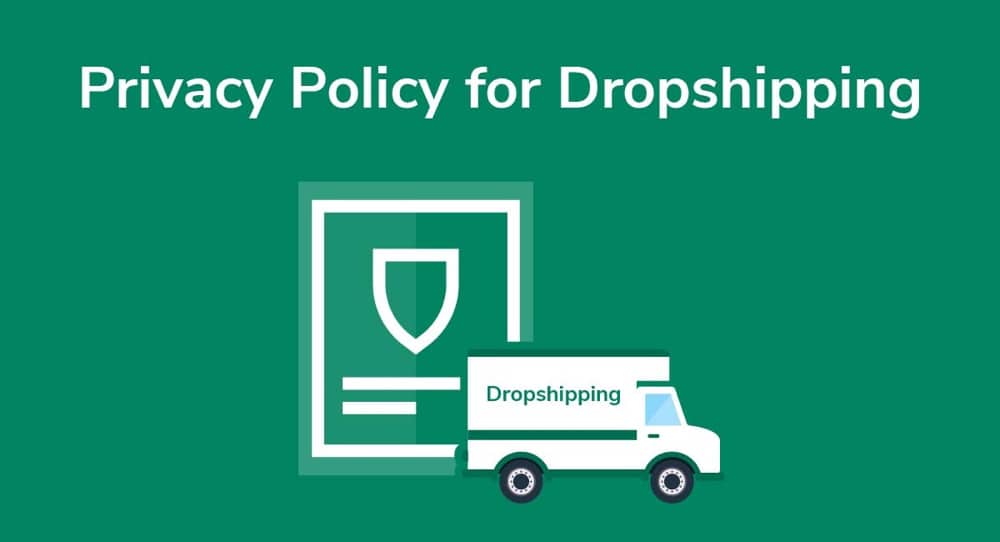
Is Dropshipping Legal? Dropshipping beginners often ask this question, and it may not seem like the real deal if you aren’t familiar with Dropshipping.
But the fact is, Dropshipping is a legal, popular business model, and it is also one of the fastest-growing types of e-commerce businesses.
This article will explain what Dropshipping is and how it works. In addition, we’ll guide you on everything you need to know about running a legal Dropshipping business.
What Is Dropshipping?

Dropshipping is a popular retail fulfillment method for online stores, and the retailer does not keep any inventory.
When a customer orders, the retailer purchases the product from a third-party supplier. And then, the supplier ships the product directly to the customer on behalf of the retailer.
In other words, dropshipping is an online intermediary that facilitates the transaction between the supplier and the customer without having to handle the product.
Today, dropshipping has become a highly profitable e-commerce business model that requires very little investment to get started.
For entrepreneurs, dropshipping is a low-cost, low-risk way to sell online because it does not require owning inventory or operational facilities.
How Does Dropshipping Work?
Dropshipping works by having the supplier handle all inventory and fulfill orders accepted by the retailer, the products are owned and stored by the supplier.
Simply put, when a customer places an order, the retailer pays the supplier, who ships the product directly to the customer on behalf of the retailer.

There are 5 main steps in the dropshipping process:
- The customer places an order with a dropshipping retailer.
- The retailer processes the order and forwards it to a supplier.
- The supplier receives the order from the retailer.
- The supplier ships the product to the customer directly.
- The customer receives the product.
Unlike traditional retail, dropshipping businesses have minimal overhead and lower operating costs. Most of their work is managing a website, working with marketplaces and suppliers, and processing orders.
Is Dropshipping Legal? We’ve Got the Answers
Yes, dropshipping is perfectly legal! Because no law claims it is illegal or prohibited.
Dropshipping is so popular that almost every major retailer uses it to fulfill customer orders, even online giants like Wayfair, Home Depot, and Amazon.
However, as it is a relatively new online business option, some dropshipping practices may be illegal.
For example, many people are familiar with dropshipping on sites like AliExpress, while it’s technically legal, there are some legal and ethical gray areas when using these sites to set up a dropshipping business.
So, keep in mind that you must consider some legal issues when setting up and running an e-commerce business. Depending on where you operate, some business registration and tax requirements may exist.
Is Dropshipping Legal? Legal Requirements
If you have never run an online store before, you must be careful not to overlook any legal requirements for setting one up. It has been proven that dropshipping does have its flaws.
So if you want to protect yourself and your business in the long run, we highly recommend taking legal steps to make your business legal.
Here are the most important things to do to ensure that your dropshipping business is legal:
1. Getting a business license
For new dropshippers, one of the main questions that immediately comes to mind is: do I need a business license?
Generally speaking, the answer is “no”. You don’t need a business license to create a store and work with suppliers.
However, you don’t need one doesn’t mean it’s not a good idea to formally register your business under your location’s requirements.

Having a business license is not a legal requirement, but it is certainly worth the effort. Here are some of the ways you will benefit from having a business license while doing so.
It makes it easier to file taxes
Combining personal and business taxes can be confusing, so keep everything separate.
Prove that you are real
If you try to work with a high-caliber provider, they will want to prove you are legitimate. Your company registration documents will get your foot in the door.
It can protect you legally
If a client sues your LLC, this means you may not be personally liable. It’s the difference between losing your business or losing both your business and your house.
Please note that there are different options for which type you should register, depending on where you plan to register your business.
Be sure to carefully evaluate your options to determine which is best for your situation.
2. Pay your taxes on time
Paying taxes is one of the legal requirements for dropshipping. As a dropshipping owner, you are legally obligated to pay taxes, including income and (in some cases) sales tax.
This tax will always be paid to the local government, regardless of where the customer or supplier is. The tax process may vary depending on the geographic location of each dropshipping business, just like a business license.
Also, this factor is another important one for your business to be recognized and prove its legitimacy. Taxation is an evolving part of e-commerce; therefore, it is best to consult an accountant and tax attorney on this issue.
3. Develop Legal Agreements and Disclaimers
Keep your dropshipping store legal with the proper legal agreements and disclaimers. You know, when you use a website with all those pages and pop-ups full of legal language and checkboxes you must agree to?
So, your online dropshipping store needs some of those things too.
Again, we recommend you consult with legal counsel to ensure that the disclosures you create are specific to how your e-commerce business operates.
4. Don’t infringe on copyrights
Unfortunately, one of the most common mistakes made by dropshipping beginners is selling copyrighted products.
This is because copyright laws are not strict in the countries where most products are manufactured.
Ensure you understand copyright laws and only work with suppliers you trust; learn how to find suppliers who offer products that are not subject to copyright laws.
You may be sued for selling it even if you are not the one who made the product.
5. Have a refund policy

As a dropshipper, refunds are a cost you must bear and incorporate into your product pricing. Unethical dropshippers will often do everything they can not refund. However, this is not only wrong but also illegal in many cases.
It’s essential to define a refund policy for your store clearly. You need to let customers know what they are entitled to and what they can expect if things go wrong.
6. Take responsibility for your products
Suppose your customer ordered a product and received it from an overseas seller. The package or order was possibly damaged during the product delivery.
Therefore, you might consider purchasing product liability insurance to protect your business and provide a great customer experience. You can claim damaged products immediately and avoid any unforeseen legal issues.
7. Sign a supplier contract
As your transaction volume increases, more formal contracts are signed between your company and your suppliers. A dropshipping contract is just another form of distribution agreement.
However, an agreement or contract helps ensure that all parties comply with their responsibilities. You must sign one to protect your rights in case of ambiguity or dispute.
8. Do the right email marketing
When you start getting traffic on your website through other marketing strategies, you will notice an increase in your followers.
One way to better promote your business is to update your customers with exclusive offers by subscribing to a newsletter.
However, once you start advertising to this audience, you will need to ensure you are legally compliant with your country’s anti-spam laws.
Ensure you are not breaking any rules, which will vary slightly depending on your region.
Is Dropshipping Legal on Amazon?

Yes, Amazon allows their merchants to do dropshiping on their platform. However, Amazon’s dropshipping is not as simple as other forms of dropshipping.
There are some Amazon dropshipping rules and regulations that you need to follow, such as:
Examples of dropshipping that are allowed
- Always be the seller of record for the product.
- Identify yourself as the seller on the packing list, invoices, and other product-related information.
- Remove all information that identifies third-party sellers, including invoices, external packaging, packing list, etc., before shipping orders.
- Remain responsible for accepting and processing returns.
Examples of dropshipping that are not allowed
- Purchase products from another online retailer and have them shipped directly to the customer by that retailer.
- Shipping an order with a packing list, invoice, or other information indicating a seller’s name or contact information other than yourself.
Follow all terms of your seller agreement and the policies of Amazon and dropshipping.
Read more about Amazon Dropshipping Policy
Is Dropshipping Legal on eBay?
The answer is yes. Dropshipping on eBay is completely legal and does not involve any illegal elements. You can dropship anything on the platform, as long as you don’t violate any rules or eBay policies.
Let’s take a look at eBay’s dropshipping policy:
- Sellers must guarantee delivery within 30 days of the end of the listing.
- Sellers must ensure that the products they list are purchased from a wholesaler, usually buying items in bulk.
- Can’t sell products from retail sites like Amazon and AliExpress.
- Products must be delivered as advertised.
If you do not follow these policies, you may receive penalties or even have your account suspended. Therefore, it is important to work with a trusted manufacturer so that eBay sellers can avoid this problem.
Read more about eBay Dropshipping Policy
Is Dropshipping Legal on Shopify?
Yes, it is legal to do dropshipping through the Shopify store. You can start dropshipping on the platform by finding a supplier to deliver your products to your target location.
As always, you just need to ensure you’re not breaking any laws related to this business model.
For example:
- All products you offer must be legal.
- The tax ID, Social Insurance Number (SIN), or Social Security Number you use to register on Shopify should be genuine.
- All transactions between you and your customers should be non-fraudulent and within the limits of the law.
Read more about Shopify Dropshipping Policy
Is Dropshipping Legal on AliExpress?

The answer is easy to guess; yes, dropshipping from AliExpress is perfectly legal. It can be very profitable if done right.
AliExpress is known for bringing dropshipping to the masses by providing sellers with an easy online selling process.
For many suppliers on AliExpress, dropshipping is an increasingly important part of their business model as e-commerce stores buy their products to sell to their customers.
Therefore, dropshipping products from AliExpress and selling them to different consumers is legal and encouraged in the global economy.
If you plan to use AliExpress as a source of products for your dropshipping store, this is a great decision that is convenient for you and your supply partners.
Is Dropshipping Legal? FAQ
1. Is dropshipping safe?
If you are wondering if you could get in trouble for dropshipping, you shouldn’t be nervous about it. You’re safe unless you’re reselling a product that infringes on someone’s copyright.
However, pick your suppliers wisely and don’t resell poor-quality goods. Otherwise, an unhappy customer may sue you if your product causes any damage to them.
2. Is dropshipping worth it?
Dropshipping can be profitable, but it depends on many factors. Considering the fees and percentage costs charged by various middlemen, it may not be worth pursuing a dropshipping business.
There is also a lot of competition in the dropshipping niche. Because it requires very little investment, the reseller business often offers products at meager prices. To compete, you usually have to lower your costs as well.
3. Is dropshipping legal for branded products?
Dropshipping of branded products is not allowed. At least, it is illegal to do so without a brand license.
While AliExpress may have products from Nike, Disney, Adidas, Star Wars, and other companies/trademarks, this does not mean you can sell these products on your online store.
4. Is dropshipping legal in which countries?
Dropshipping is legal in the following countries and applies in most countries:
- United States (USA)
- Canada
- European countries
- Australia
In European countries, you will need to address your tax issues.
5. Do I need to be responsible for shipping my products?
No, if your website is integrated with a wholesaler supplier website, your orders will automatically be shipped to your customers.
6. Do I have to deal with customer issues?
Yes, you are the point of contact between the customer and the supplier, so you must manage customer complaints and concerns on an ongoing basis.
Is Dropshipping Legal? Conclusion
We’ve answered this question. “Is dropshipping legal?” Dropshipping is a perfectly legal and legitimate form of e-commerce business.
Follow the guidelines set by your location and ensure the best customer experience for maximum legal protection.
A great way to not worry about the legality of what you’re selling is to use Yansourcing to browse vetted and popular products that are ready to be sold online.
I am Yan, the founder of Yansourcing, the best dropshipping agent in China, who can quickly and safely help you buy and import from China. If you need help sourcing from China, please do not hesitate to contact us.
